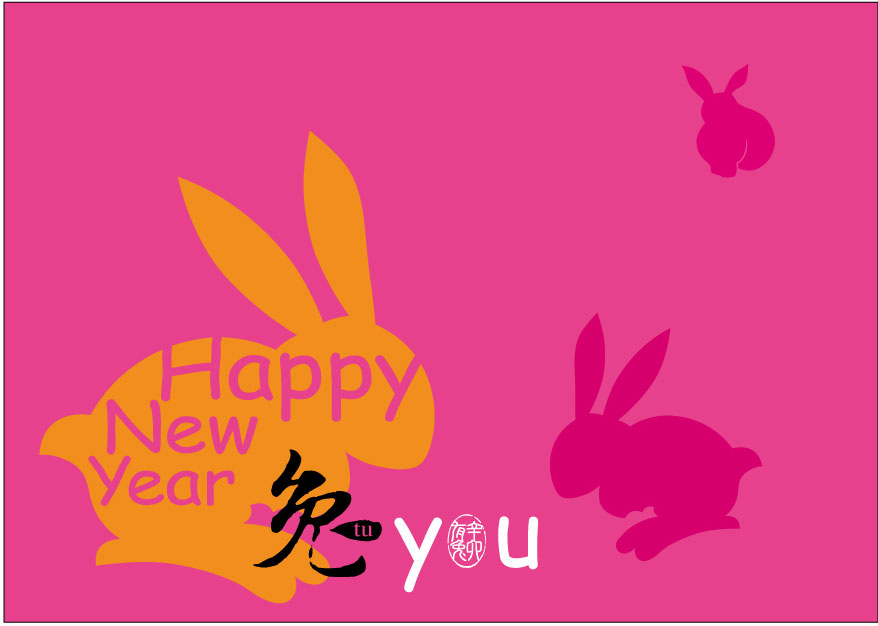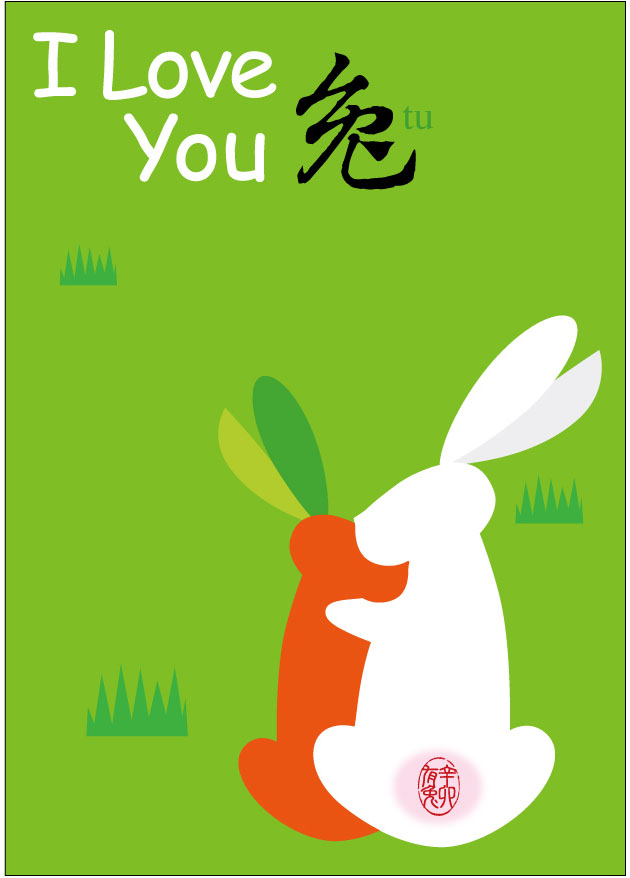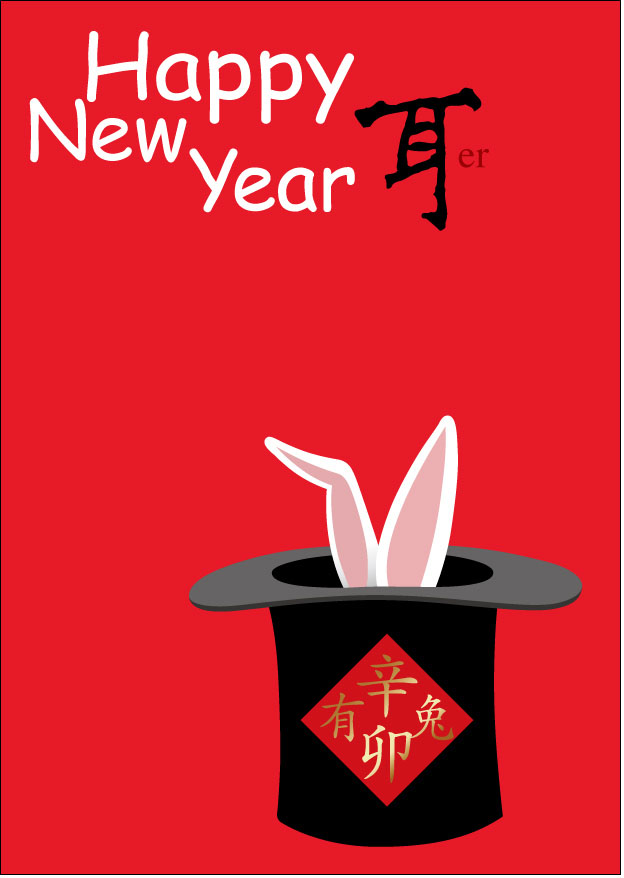Happy New Year Rabbit You
« previous post | next post »
Two years ago, the favored lunar New Year's greeting in China was "Happy 牛 Year!" where 牛 ("bovine") is pronounced niú in Mandarin and is standing in for "New" in the Year of the Ox / Bull / Cow.
Last year, the Year of the Tiger, "I 老虎 U", where lǎohǔ 老虎 (which means "tiger") sounds like "love" to some Chinese speakers, was conveniently and concurrently being used to celebrate the New Year, Valentine's Day, and a famous golfer's amorous escapades.
Well, this is the year of the rabbit, so you can be sure the Chinese would come up with a clever way to incorporate their word for rabbit (or hare) in this year's favored New Year's greeting, and indeed they have.
What we have for the current year is "Happy New Year 兔 you", where tù 兔 ("rabbit, hare") is standing in for English "to," hence "Happy New Year to You!"
This clever New Year's greeting, which is already flying around the Chinese cybersphere, seems to have won out over two other less catchy attempts to incorporate a bunny wabbit into the mandatory New Year's Sino-English salutation.
First,
Since you're already catching on (learning Chinese fast!), you'll recognize that this one says "I Love You 兔." I don't need to tell you what that means.
Second, and the lamer of the losers,
"Happy New Year 耳," where ěr 耳 (the character is actually a stylized pictogram of an ear) is supposed to echo "year," and visually plays with the long ears of the rabbit protruding from a magician's top hat.
In all three of the designs presented above, note that toneless pinyin has been added for those who are not proficient in Chinese characters (they weren't leaving anything to chance!). The prompting of character pronunciation with pinyin appears to be a growing phenomenon in China, one which I shall cover in future posts as well.
Finally, so as not to leave my reader unnecessarily mystified, all three of the designs incorporate the following four characters: xīn mǎo yǒu tù 辛卯有兔 ("[in the] xīnmǎo [year] there is [a] rabbit"). Xīn and mǎo are the cyclical "stem" and "branch" for the the lunar year that runs from February 3, 2011 to January 22, 2012. This is obviously intended to lend a traditional touch (especially the seal script forms written in the small circles) to the otherwise overly modern, and even Western, look of the overall designs.
[A tip of the hat to Jacob Rutherford, who mentioned this year's greeting on his blog. ]



Leonardo Boiko said,
January 4, 2011 @ 11:25 am
Happy Year of the Metal Rabbit! (I’m sorry…) (Cultural explanation)
Mary Bull said,
January 4, 2011 @ 11:25 am
Many thanks for posting this — I enjoyed all four images, and, since I don't know any more about Chinese than I've learned here at LL, I appreciate your explanations very much, too.
A friend in Bangkok tells me that, since I was born in 1927, I'll be completing my 12th cycle under the auspices of the Rabbit on February 3, 2011. And I enjoy knowing that, also. He says it will be an auspicious year for me. :)
Happy New Year 兔 You « Bilingualism Research Today said,
January 4, 2011 @ 12:10 pm
[…] Language Log: Two years ago, the favored lunar New Year's greeting in China was "Happy 牛 […]
Joseph Haskell said,
January 4, 2011 @ 2:00 pm
I'll be sure to say "Rabbit, rabbit"!
Chandra said,
January 4, 2011 @ 3:13 pm
@Leonard Boiko: I thought you were going to link to something like this. Although I suppose that's meant to reference a far less cute and fluffy type of animal…
J. Goard said,
January 4, 2011 @ 9:57 pm
@Chandra:
Me too. But are you suggesting that goats aren't cute???
Marsha Jones said,
January 4, 2011 @ 11:33 pm
Cutte post and happy rabbit year to everyone Just one thing. Where the blogger says …."you can be sure *the Chinese* would come up with a clever way to incorporate their word for rabbit (or hare) in this year's favored New Year's greeting, and indeed *they* have…" — emphasis mine with asterisks — I wonder if it would be better to write "people in the Chinese-speaking world" or "some wordsmiths, or charactersmiths, in the Chinese-speaking world…." rather than THE CHINESE….because THE CHINESE did not come up with this rabbit fun, just a few people in the Chinese-speaking world did this, and for all we know, some of them
might be passport-carrying dudes from Malaysia or Singapore or Hong Kong or Maco or god forbid that renegade province called Taiwan, and surely if some people in Taiwan did this rabbit fun thing, we cannot call them Chinese for they are Taiwanese….it is kind of like saying THE JEWS or THE JEWISH or THOSE JAPANESE………shouldn't we speak of the people of live in China as "Chinese people" and not THE CHINESE, like THOSE PEOPLE? it just seems rude and racy [re racialist ] to me…… and I'm one of them WHITIES from South Frica….
The Man said,
January 5, 2011 @ 7:23 am
Marsha, Marsha, Marsha, relax. It's hardly racist to call Chinese Chinese or Jews Jews. One can after all still speak of the French when speaking of the french language even though there are non-french people living inside the borders of France and many French people living outside. And I think you'll have to look long and hard to find anyone to take offense at foreigners being impressed with clever chinese wordplay.
chris said,
January 5, 2011 @ 9:36 am
I thought "Chinese" wasn't an ethnicity, anyway, because China is too large and ethnically diverse. (At most you might call it a nationality, but ISTM that in context, it is clear that "speakers of the Chinese language(s)" is meant anyway.) He didn't say the Han came up with this clever wordplay — because it might have been a Han, or some other Chinese-speaking person of some other ethnicity; he probably didn't know and even more probably didn't care.
Jesse Tseng said,
January 5, 2011 @ 2:53 pm
I'm still a bit mystified by the "辛卯有兔". As far as I know, this is not a conventional way of reminding people what the year is, and anyway a factual statement like that doesn't call for the seal-script or red and gold paper treatment. I would expect it to be a wish, but then the interpretation is "May you have rabbits this year"… Unless 有兔 has some metaphorical, literary, or punning association that jumps out at Chinese speakers.
David B Solnit said,
January 5, 2011 @ 5:38 pm
@Jessie:
Yes, I thought it might be similar to 年年有餘 niánnián yǒu yú 'every year there is surplus' accompanied by a picture of a fish, punning on yú 魚 'fish'/ 餘 'surplus'. But I can't find a very good candidate for the pun on 'rabbit'–maybe 途 tú 'road,way', so 'xin mao has a way' [i.e. has an auspicious future??]. Wrong tone, though.
Anybody out there have a better idea?
Jacob said,
January 5, 2011 @ 6:59 pm
@Jesse @David B Solnit: 卯 is the 4th heavenly stem. Another definition is: 属兔 or someone who was born in the year of the rarbbit.
David B Solnit said,
January 5, 2011 @ 7:28 pm
@Jacob: So it's just redundant? "In the rabbit year there is a rabbit"? That wouldn't be very catchy. Still feels like a(n attempted) pun to me.
Jacob said,
January 6, 2011 @ 2:03 am
@David: I'm probably the last person you should consult on things from the Yi Jing and the heavenly stems/earthly branches.
According to Wikipedia, 辛卯年 or Xinmao Year is a year of astrological significance and occurs once every 60 solar years. This (coming) year it happens to be the year of the rabbit. Which I suppose may make it some sort of pun since this 辛卯年 is in the year of the rabbit and anyone who is born this year is 卯 or born in the year of the rabbit.
William Page said,
January 6, 2011 @ 2:16 am
Not wishing to ruffle politically incorrect waters, but when I was a young GI on Taiwan several incarnations ago, we learned that the word for a homosexual was tudz (Yale romanization), which is homophonous with the word for rabbit. (The character might or might not be the same; I'm too lazy to go dig out the dictionary.) May we infer from this that the year of the rabbit will be a good year for our gay brethren and sistren? That would be nice, because they've been bashed around quite enough throughout the years. If it could be spread around that the year of the rabbit also means the year of the gay, it might cause quite a stir on the Internet.
Mandarin puns « Karela Fry said,
January 6, 2011 @ 9:25 pm
[…] on the topic of China, Language Log documents Mandarin puns in English: Two years ago, the favored lunar New Year's greeting in […]
chris said,
January 7, 2011 @ 9:14 am
According to Wikipedia, 辛卯年 or Xinmao Year is a year of astrological significance and occurs once every 60 solar years. This (coming) year it happens to be the year of the rabbit.
I don't think there's any "happens to be" about it — unless I'm misunderstanding the system, "mao" refers to the Earthly Branch associated with the rabbit, so every time it comes up in the 60-year cycle it's a year of the rabbit.
On the other hand, since the word for the Earthly Branch and the word for the actual furry hopping animal are apparently different, maybe it's just intended as a reminder for people who aren't that knowledgeable about traditional Chinese astrology?
Bob Violence said,
January 8, 2011 @ 7:00 am
On the other hand, since the word for the Earthly Branch and the word for the actual furry hopping animal are apparently different…
卯 is associated with rabbits, but I don't think it ever actually meant "rabbit". Wenlin says it originally meant "to kill an animal as a sacrifice" and the ABC Etymological Dictionary of Old Chinese defines it as "slaughter". It's possible the word originally meant "rabbit" and 卯 served as a phonetic loan character, but the ABC dictionary, at least, doesn't make this claim. In any case it doesn't mean "rabbit" now and your "reminder" theory sounds OK to me.
Bob Violence said,
January 8, 2011 @ 7:37 am
A little side-note: in Vietnam the Year of the Rabbit becomes the Year of the Cat, supposedly because the fourth Earthly Branch 卯 (Vietnamese mão or mẹo) sounds rather like the word for "cat" (Vietnamese mèo) and cats had more resonance for them. (On the other hand, a minority theory has it that the cat was the original animal and the northerners changed it to the rabbit.)
bryan said,
January 9, 2011 @ 9:24 pm
辛卯有兔 = made by ignorant foreigner! Doesn't exist and doesn't make sense grammatically according to Chinese grammar UNLESS it's a fixed phrase in Classical/Ancient Chinese, but it never was! Just some "Sinologist" trying to mess up the Chinese language by using some made up "Classical Chinese" which makes absolutely NO sense at all!
卯 = 兔年 [Year of the Rabbit]
辛卯 = Metal Rabbit year in 2011
有, "to have / to exist" is unnecessary here.
It might be amusing to foreigners, but it's insulting to use 兔, tu just for it's phonetic properties for Chinese people.
bryan said,
January 9, 2011 @ 9:31 pm
Saying Happy Chinese New Year a month or any time away from the actual date is unnecessary. I don't see people saying "Happy New Year" until close to January 1!
By the way, we never say "Happy Chinese New Year" in English anyway. Almost always "新年快樂" or other greetings in Chinese amongst the Chinese people.
bryan said,
January 9, 2011 @ 9:37 pm
Here's some Chinese idioms or proverbs involving rabbits:
守株待兔 Sitting by a stump, waiting for a careless hare
狡兔三窟 A wily hare has three burrows.
狡兔死,走狗烹 When the crafty hares have been exterminated, the hunting dogs will be cooked
bryan said,
January 9, 2011 @ 9:59 pm
@ Jessie @ 年年有餘:
年年有魚 is the Chinese pun for 年年有餘 but there's no such pun for anything involving rabbits.
动如脱兔 as quick as a fleeing hare
兔死狐悲,物伤其类 the fox mourns the death of the hare—like feels for like
玉兔东升。The moon was rising in the east. Here the 玉兔**, jade rabbit, is synonymous for the moon due to the Chinese myth story 嫦娥*, a woman who took the immortal elixir [from 西王母, the Mother Queen of the West] and went to live on the moon. Her husband = 后羿***
*http://zh.wikipedia.org/zh-tw/%E5%AB%A6%E5%A8%A5
**http://zh.wikipedia.org/zh-tw/%E6%9C%88%E5%85%94
***http://zh.wikipedia.org/zh-tw/%E5%90%8E%E7%BE%BF
Bob Violence said,
January 10, 2011 @ 1:13 am
It might be amusing to foreigners, but it's insulting to use 兔, tu just for it's phonetic properties for Chinese people.
Yes, clearly this is deeply offensive to the Whole Chinese People.
"辛卯有兔" does indeed turn up very few hits (at least ones not referring to this post), but "辛卯兔年" turns up millions and has the same redundancy issue (since a 卯 year is always a 兔 year). In some sources the "兔" appears in parentheses, which lends credence to the idea that the apparent redundancy serves to remind people just what 卯 is associated with.
Jesse Tseng said,
January 10, 2011 @ 6:33 am
The most salient phonetic association I get with 有兔 is 嘔吐, which is not very auspicious. And if I heard the whole sentence out loud, I would first interpret it as 新毛有兔, and I would guess it was some kind of Soviet Russia joke for Chinese furries.
xah lee said,
January 13, 2011 @ 7:37 pm
雄兔腳撲朔,
雌兔眼迷離,
兩兔傍地走,
安能辨我是雄雌?
JMS said,
January 20, 2011 @ 11:59 am
I'm still a bit mystified by the "辛卯有兔"… Yes, I thought it might be similar to 年年有餘 niánnián yǒu yú
@ Jesse, David: Hmmm… as "Stem-Branch-yǒu yú" 'may there be fish/abundance this S-B year' is also a typical New Year's salute, perhaps there is nothing more here than 'may there be rabbits this S-B year' (Ha?)
辛卯有兔 = made by ignorant foreigner! … By the way, we never say "Happy Chinese New Year" in English anyway. Almost always "新年快樂" or other greetings in Chinese amongst the Chinese people.
& Bryan: Given your obvious commitment to "Chineseness", might I suggest you replace the disgracefully Westernized "新年快樂" with the thoroughly Chinese "過年好" for future salutations to your Chinese brethren?
Pinyin news » Going south with official Taiwan map said,
February 1, 2011 @ 9:53 am
[…] In the past, when I found romanization errors in official government documents I often contacted the agencies in charge so they could make improvements. But as those who live in Taiwan may have noted, this practice has had limited success. And in the process I've built up a great deal of bile from encountering bureaucratic roadblocks to fixing mistakes. So is it any wonder that when I see things like this map, I often think, "Wǒ hǎo xiǎng tù." Maybe now it's time to start going with that feeling — metaphorically speaking. And what could be more appropriate, given that we are about to have a tùnián? (I know, I know: That pun's probably not going to make any of the New Year cards.) […]
Happy Chinese New Year ‘tu’ you! | Language and Humor Blog said,
February 3, 2011 @ 8:55 pm
[…] Chinese New Year's Day. Happy Year of the Rabbit! According to Language Log, the clever thing for Chinese cards now is Chinese-English mixing of greetings. […]